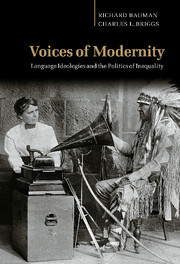Book contents
- Frontmatter
- Contents
- Preface
- 1 Introduction
- 2 Making language and making it safe for science and society: from Francis Bacon to John Locke
- 3 Creating modernity's others in seventeenth- and eighteenth-century England: antiquarian and philological inflections
- 4 The critical foundations of national epic and the rhetoric of authenticity: Hugh Blair and the Ossian controversy
- 5 Language, poetry, and Volk in eighteenth-century Germany: Johann Gottfried Herder's construction of tradition
- 6 Scientizing textual production in the service of the nation: the Brothers Grimm and Germanic philology
- 7 The making of an American textual tradition: Henry Rowe Schoolcraft's Indian researches
- 8 The foundation of all future researches: Franz Boas's cosmopolitan charter for anthropology
- 9 Conclusion
- References
- Index
7 - The making of an American textual tradition: Henry Rowe Schoolcraft's Indian researches
Published online by Cambridge University Press: 22 September 2009
- Frontmatter
- Contents
- Preface
- 1 Introduction
- 2 Making language and making it safe for science and society: from Francis Bacon to John Locke
- 3 Creating modernity's others in seventeenth- and eighteenth-century England: antiquarian and philological inflections
- 4 The critical foundations of national epic and the rhetoric of authenticity: Hugh Blair and the Ossian controversy
- 5 Language, poetry, and Volk in eighteenth-century Germany: Johann Gottfried Herder's construction of tradition
- 6 Scientizing textual production in the service of the nation: the Brothers Grimm and Germanic philology
- 7 The making of an American textual tradition: Henry Rowe Schoolcraft's Indian researches
- 8 The foundation of all future researches: Franz Boas's cosmopolitan charter for anthropology
- 9 Conclusion
- References
- Index
Summary
Henry Rowe Schoolcraft (1793–1864) is accorded by intellectual historians a status similar to that of the Grimms, his close contemporaries, as a founding ancestor of folklore and anthropology. A. I. Hallowell has observed that “Historically viewed, Schoolcraft was a pioneer in the collection of the folklore of any non-literate people anywhere in the world” (1946: 137); Rosemary Zumwalt has called him “the first scholar of American Indian culture to collect and analyze a large body of Indian folklore” (1978: 44); and W. K. McNeil credits him with being “the man generally recognized as the father of American folklore and anthropology” (1992: 1). As with the Grimms, critics are divided or ambivalent concerning the scholarly validity of Schoolcraft's work. Some, like Stith Thompson, are strongly negative: “Ultimately, the scientific value of his work is marred by the manner in which he reshaped the stories to suit his own literary taste. Several of his tales, indeed, are distorted almost beyond recognition” (1929: xv; see also Thompson 1922). The vocabulary and rhetoric here are strikingly similar to some of the assessments of the Grimms cited in our earlier discussion. Others, like Zumwalt and William Clements, author of an illuminating study of Schoolcraft's textual practices, credit many of Schoolcraft's pronounced methodological principles, but fault him for his lack of adherence to those principles in practice (Zumwalt 1978: 49; Clements 1996: 117).
- Type
- Chapter
- Information
- Voices of ModernityLanguage Ideologies and the Politics of Inequality, pp. 226 - 254Publisher: Cambridge University PressPrint publication year: 2003

